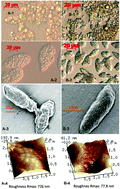Investigation of enhanced oxidation stability of microencapsulated enzymatically produced tuna oil concentrates using complex coacervation
Abstract
Tuna oil was selectively hydrolysed using Thermomyces lanuginosus lipase for 6 h to prepare omega-3 acylglycerol concentrate with the DHA content significantly increased from 24.9% in tuna oil to 36.3% in the acylglycerol concentrate. The acylglycerol concentrate was subsequently encapsulated into the “multi-core” microcapsules using gelatin–sodium hexametaphosphate complex coacervates as the shell material. Rancimat, Oxipres and thermogravimetric analyses all showed that the microencapsulated acylglycerol concentrate had unexpectedly improved oxidation stability, compared to those produced using tuna oil, even though the concentrated oils themselves were significantly less stable than tuna oil. The incorporation of enzymatic tuna oil acylglycerol concentrate also significantly improved the oxidation stability of microencapsulated standard refined unconcentrated tuna oil. A wide range of characteristics including lipid and fatty acid composition, oil-in-water (O/W) emulsion properties, morphology, nanomechanical strength and physicochemical stability of acylglycerol, acylglycerol oil-in-water (O/W) emulsion and final microcapsules were investigated throughout the preparation. The result suggests that high levels of monoacylglycerol (about 35%) and diacylglycerol (about 8.5%) were produced in the acylglycerol. The acylglycerol O/W emulsion exhibited significantly smaller droplet size, lower zeta-potential and higher surface hydrophobicity, which contributed to the formation of the microcapsule with a significantly smoother surface and more compact structure, finally leading to improved oxidative stability compared to those prepared from native tuna oil.



 Please wait while we load your content...
Please wait while we load your content...